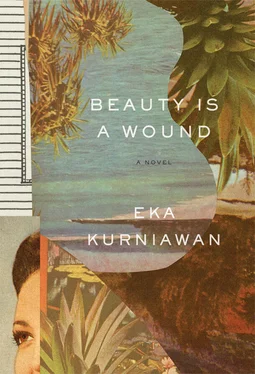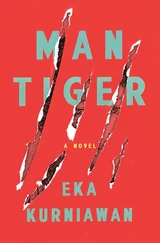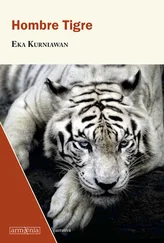But not everything went so smoothly. The little boys grew wild, ganging up with their friends from the same block and insulting one another. Fights between the children were easier to come across than an irate Japanese soldier. Their mothers felt forced to take an equally tough approach, hitting their children even though it seemed to make no difference. The Japanese had absolutely no intention of arbitrating or stopping these scuffles, quite the opposite; they instigated fights as if it was a new game for them.
Food was another problem. The rations they were given were not nearly enough for the thousands of prisoners. They were on a strict starvation diet, getting only salted rice porridge for breakfast. Lunch was whatever could be scavenged or later, the vegetables that they had planted themselves behind the cells. At night they got one slice of plain white bread. There was never any meat, and they had already hunted most of the animals in Bloedenkamp to extinction. First the mice — even though at the start nobody wanted to eat them, soon there were almost none left in the delta — and then the lizards and geckos disappeared. Then the frogs vanished. Sometimes the kids went fishing, but they weren’t allowed to go too far and had to be satisfied with fish as small as a baby’s pinky finger, or with tadpoles. The most luxurious thing was when they once found some bananas, but those were for the babies, and the women were left to fight over the peels.
Babies started to die, and then the old people. Sickness also killed young mothers, children, young girls — anyone might die at any moment. The field behind the cells turned into a cemetery.
Dewi Ayu was friendly with a young woman named Ola van Rijk. The girls had known each other for a long time. Ola’s father also owned a cocoa plantation and they often visited one another’s houses. Ola was two years younger than she was and was being held along with her mother and her younger sister. One afternoon, Dewi Ayu found her with tears streaming down her face.
“Mother is dying,” she said.
Dewi Ayu went to see. Indeed it seemed to be true. Madam van Rijk was suffering from a severe fever, quite pale and shivering. It seemed that there was nothing to be done, but Dewi Ayu told Ola to go find the commandant and ask for medicine and food from the soldiers’ rations. Ola quaked in fear at approaching the Japanese.
“Go, or your mother will die,” said Dewi Ayu.
She finally left while Dewi Ayu applied cold compresses to the sick woman’s forehead and tried to entertain Ola’s little sister. After about ten minutes Ola returned without any medicine, just crying harder. “Let her die,” she said sobbing. “What did you say?!” asked Dewi Ayu. Ola shook her head weakly while wiping away her tears with her sleeve. “There’s no way,” she said shortly. “The commandant would only give me medicine if I agreed to sleep with him.”
“Let me talk to him,” Dewi Ayu said, enraged. The commandant was in his office, sitting in his chair, staring absently at his iced coffee on the table and listening to radio static. She barged right in without knocking. The man turned, surprised by her nerve, his face showing the anger of someone who does not play around. But before he could explode, Dewi Ayu stepped forward, separated from him only by the width of the table. “I will take the place of the previous girl, Commandant. You can sleep with me, but give her mother medicine and a doctor. And a doctor !”
“Medicine and a doctor?” He already knew a few Malay phrases. This young girl was very pretty, no older than seventeen or eighteen, maybe still a virgin, and she was offering herself to him just for some fever medicine and a doctor. His anger evaporated at receiving such an extraordinary blessing on such a boring afternoon. He smiled, cunning and predatory, feeling like a lucky old man indeed, and walked around the table while Dewi Ayu waited with her typical composure. With one caress the commandant touched her whole face, his fingers creeping like a lizard over her nose and her lips, pausing at her chin to raise her face higher. His fingers continued their journey, traveling down her neck with rough hands that were too accustomed to holding a samurai sword, sweeping along the curve of her collarbone, and exploring the collar of her dress.
His hands pushed underneath the fabric and Dewi Ayu was a little startled, but the man was already grabbing her left breast, and after that he began to move much faster. The commandant opened Dewi Ayu’s dress as efficiently as he examined his troops, and then he was squeezing her chest, and kissed her neck with a greedy lust, his hands moving this way and that as if he regretted being born with only two of them.
“Be quick, Commandant, if you’re not, the woman will die.”
The commandant seemed to agree with that analysis and without saying another word he yanked at Dewi Ayu, lifted her up, and after first setting aside his cup of coffee and the transistor radio, laid her out on top of the table. He quickly stripped the girl naked, undressed himself, and then pounced onto her body like a cat onto a fish. “Don’t forget, Commandant, medicine and a doctor,” she said for reassurance. “Yeah, yeah, medicine and a doctor,” replied the commandant. Then, without beating around the bush, the Japanese man set upon her fiercely. Dewi Ayu closed her eyes, because whatever the circumstances, this was still the first time a man had taken her: she trembled a little bit, but she survived the horror. Then she couldn’t really keep her eyes closed, the commandant was shaking her body so wildly, pounding her without pause, and rocking her from left to right. The one thing she managed was dodging if he tried to kiss her on the lips. The game ended in an explosion and the commandant rolled over next to Dewi Ayu, sprawled out heaving deep and ragged breaths.
“So, how about it Commandant?” asked Dewi Ayu.
“It was amazing, like an earthquake,” he replied.
“I mean the medicine and the doctor.”
Five minutes later Dewi Ayu was happy to get a native doctor, with round glasses and a kind demeanor, and gave thanks that she wouldn’t have to do much business with the Japanese ever again. She brought him to the cell where the van Rijk family was staying and in the doorway she met Ola who immediately asked her, “You did it?”
“Yes.”
“Oh my God!” screamed the girl, crying uncontrollably. As the doctor rushed to the sick woman, Dewi Ayu tried to comfort her. “It was nothing. Just think of it like I took a shit through the front hole.”
Looking up the doctor pronounced, “This woman is already dead.”
Ever since that they lived as a trio, like a little family: Dewi Ayu, Ola, and the young Gerda, who was just nine years old. Ola and Gerda’s father had been drafted and had gone to war just like Ted, but they had not yet heard news as to whether he was still alive, captured, or dead. Their first Easter and Christmas in the camp passed, without eggs or a Christmas tree and without any candles, which had all been used up already. They tried to survive together, comforting one another and facing sickness and death. Dewi Ayu forbid little Gerda to steal anything from anybody, as the other children were doing. She wracked her brains trying to figure out what they were going to eat every day. The cows no longer grazed around the delta and the leeches were already gone.
One day Dewi Ayu saw a baby crocodile at the edge of the delta, and knowing that the only thing you really need to avoid with a crocodile on shore is its tail, she bludgeoned its head with a large stone. The unfortunate beast was wounded but it wasn’t dead. It flicked its tail back and forth, and began moving toward the river. Taking a sharpened bamboo spike that was usually used to tether the ferryboat’s ropes, with one reckless jab that she herself didn’t imagine would be powerful enough, Dewi Ayu pierced the baby crocodile’s eye and then its stomach. The creature died an agonizing death. Before its mother and friends could come for it, Dewi Ayu dragged the baby crocodile into the camp by its tail. Now they could really celebrate, with crocodile meat soup! Many people praised her bravery and shared their thanks.
Читать дальше











